Seven Impossible Interviews Before Breakfast #13:
M.T. Anderson (who is not really seven monkeys, six typewriters,
and a Speak & Spell,* no matter what he tells you)
 March 13th, 2007 by jules
March 13th, 2007 by jules
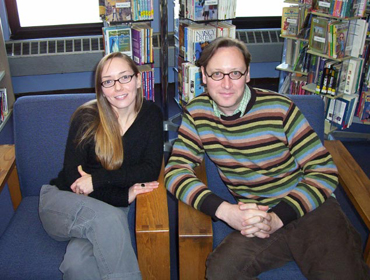 Once upon a time (last December, to be precise), Eisha and I embarked on a co-review of M.T. Anderson’s The Astonishing Life of Octavian Nothing, Traitor to the Nation, Volume One: The Pox Party, and we were pleasantly surprised to receive an expression of gratitude from the author himself, thanking us for our detailed (or rambling, depending on your point of view) commentary. And, ever the gentleman, he never once commented upon the fact that we got a bit punchy in that review, too, what with Eisha sharing the savagely funny interrupting-cow knock-knock joke and my slaphappy suggestion that Anderson consider a contemporary soundtrack for the novel, with two characters named Bono and Prince. Brilliant. If I’d known Anderson himself would be reading that, I’d have not, oh I dunno, been such a moron.
Once upon a time (last December, to be precise), Eisha and I embarked on a co-review of M.T. Anderson’s The Astonishing Life of Octavian Nothing, Traitor to the Nation, Volume One: The Pox Party, and we were pleasantly surprised to receive an expression of gratitude from the author himself, thanking us for our detailed (or rambling, depending on your point of view) commentary. And, ever the gentleman, he never once commented upon the fact that we got a bit punchy in that review, too, what with Eisha sharing the savagely funny interrupting-cow knock-knock joke and my slaphappy suggestion that Anderson consider a contemporary soundtrack for the novel, with two characters named Bono and Prince. Brilliant. If I’d known Anderson himself would be reading that, I’d have not, oh I dunno, been such a moron.
And then, after corresponding a bit and valiantly asking for an interview (with fingers crossed behind our backs), he not only acquiesced but also — instead of sending a photo, as we requested — visited Eisha at the library branch where she works in Cambridge. Yes, they’re practically neighbors, it turns out. And so they briefly visited — along with Anderson’s charming (says Eisha) girlfriend — and snapped some friendly photos for the blog. Since I couldn’t be there, being down here in the South as I am, we conducted some digital editing and added my disembodied head into one photo, as you can see below. We have M.T. to thank for that delightfully macabre idea.
Eisha had a grand ‘ol time, chatting it up with M.T. and Nicole (who gets the photo credits here, though my husband handled the placement of my free-floating head into M.T.’s and Eisha’s hands, as they boldly approximated the size of my noggin). I was insanely jealous of Eisha, but in a happy-for-her — not a bitter, I’m-going-to-slash-her-tires — way, of course. I know that Eisha would love to tell you more about their happy meeting, but I regret to say that there is a serious illness in her family. She’s out-of-commission for a bit of time and gave her blessing for me to get our M.T. interview posted and delivered to you, our friendly readers. I’d like to quickly request that we all keep Eisha and her family in our thoughts.
Now, upwards and onward then . . .
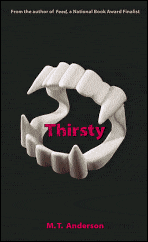 If you’re reading this interview, you probably are a fan of Anderson’s craftmanship as we are, and we probably don’t need to tell you about his talents as a spinner of stories and a teller of tales. In that case, scroll down to the seven stars where the interview begins. But — in the vain hope that we can perhaps convert any newcomers to his books (and for fans who want a bit more info) — we’ll also tell you now a bit about his career thus far . . . Anderson has written for a wide variety of ages in the realm of children’s literature — from picture books to YA novels. As Kirkus Reviews put it in a November ’06 interview, he “arrived on the children’s book scene with a vampire novel {Thirsty, Candlewick Press, 1997}, and . . . followed that up with picture-book biographies of classical composers, a send-up of series fiction and novels that contain some pretty heavy social commentary — among others.” When asked in that interview about this variety of subject matter, Anderson responded that it comes from “{r}estlessness and over-enthusiasm, I guess. I tend to get fixated on subjects serially, and I often write about them to exorcise my interest. I also believe firmly in forcing yourself to do things you think you can’t do, things you’ve never done before. The world is a dazzlingly varied place — why should we assent to limiting ourselves? Better to try and to fail . . .”
If you’re reading this interview, you probably are a fan of Anderson’s craftmanship as we are, and we probably don’t need to tell you about his talents as a spinner of stories and a teller of tales. In that case, scroll down to the seven stars where the interview begins. But — in the vain hope that we can perhaps convert any newcomers to his books (and for fans who want a bit more info) — we’ll also tell you now a bit about his career thus far . . . Anderson has written for a wide variety of ages in the realm of children’s literature — from picture books to YA novels. As Kirkus Reviews put it in a November ’06 interview, he “arrived on the children’s book scene with a vampire novel {Thirsty, Candlewick Press, 1997}, and . . . followed that up with picture-book biographies of classical composers, a send-up of series fiction and novels that contain some pretty heavy social commentary — among others.” When asked in that interview about this variety of subject matter, Anderson responded that it comes from “{r}estlessness and over-enthusiasm, I guess. I tend to get fixated on subjects serially, and I often write about them to exorcise my interest. I also believe firmly in forcing yourself to do things you think you can’t do, things you’ve never done before. The world is a dazzlingly varied place — why should we assent to limiting ourselves? Better to try and to fail . . .”
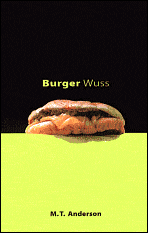 Thirsty was followed-up with 1999’s Burger Wuss (published by Candlewick as well), which Publishers Weekly called a “witty tale of a lovelorn boy and his corporate antagonists {that} is both a tasty read and a stinging satire.” Immediately following these two YA novels, Anderson took a turn at a picture book —
Thirsty was followed-up with 1999’s Burger Wuss (published by Candlewick as well), which Publishers Weekly called a “witty tale of a lovelorn boy and his corporate antagonists {that} is both a tasty read and a stinging satire.” Immediately following these two YA novels, Anderson took a turn at a picture book — 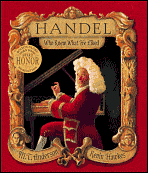 Handel, Who Knew What He Liked, illustrated by Kevin Hawkes (Candlewick, 2001), which was named a 2002 Boston Globe-Horn Book Awards Honor Book in the Non-fiction Category. School Library Journal described this picture-book biography as possessing “a saucy style, impeccable pacing, and a richness of content.” Writes Anderson in the book’s opening, bringing Handel to life with refreshingly irreverent style: “This is George Frideric Handel. He looks very satisfied with things. He’s smiling a little, as if he’s very sure of himself. You’d have to be sure of youself to wear a wig that gigantic.” Children, no matter their familiarity — or lack thereof — with classical music, can relate to Handel as a child, who was willful, headstrong, sometimes roguish, growing into the man who knew what he liked and knew how to get it.
Handel, Who Knew What He Liked, illustrated by Kevin Hawkes (Candlewick, 2001), which was named a 2002 Boston Globe-Horn Book Awards Honor Book in the Non-fiction Category. School Library Journal described this picture-book biography as possessing “a saucy style, impeccable pacing, and a richness of content.” Writes Anderson in the book’s opening, bringing Handel to life with refreshingly irreverent style: “This is George Frideric Handel. He looks very satisfied with things. He’s smiling a little, as if he’s very sure of himself. You’d have to be sure of youself to wear a wig that gigantic.” Children, no matter their familiarity — or lack thereof — with classical music, can relate to Handel as a child, who was willful, headstrong, sometimes roguish, growing into the man who knew what he liked and knew how to get it.
 Then came this little book in 2002 called Feed — with one of the most memorable opening lines of all YA literature: “We went to the moon to have fun, but the moon turned out to completely suck.” Following the lead of Orwell and Vonnegut, Anderson created a striking dystopian world of the future (“sure to appeal to anyone who appreciates smart satire, futuristic fiction laced with humor, or any story featuring skin lesions as a fashion statement,” says the book’s blurb at Candlewick’s site). Set in a society where people connect to the Internet via feeds implanted in their brains, Anderson brought us an engaging YA novel that managed to be subversive, disturbing, and funny all at once in its indictment of our media-dominated, corporate culture — and with the unforgettable heroine, Violet, not afraid to think for herself in a culture of chilling conspicuous consumption, not a stranger to the one in which we live today. For anyone who was perhaps not already paying attention to Anderson, Feed cemented his arrival in the crowded landscape of YA lit. Here is just a smattering of awards it received: National Book Award Finalist; ALA Best Books for Young Adults; Boston Globe-Horn Book Awards Honor Book, Los Angeles Times Book Prize; and NewYork Times Book Review Notable Book of the Year.
Then came this little book in 2002 called Feed — with one of the most memorable opening lines of all YA literature: “We went to the moon to have fun, but the moon turned out to completely suck.” Following the lead of Orwell and Vonnegut, Anderson created a striking dystopian world of the future (“sure to appeal to anyone who appreciates smart satire, futuristic fiction laced with humor, or any story featuring skin lesions as a fashion statement,” says the book’s blurb at Candlewick’s site). Set in a society where people connect to the Internet via feeds implanted in their brains, Anderson brought us an engaging YA novel that managed to be subversive, disturbing, and funny all at once in its indictment of our media-dominated, corporate culture — and with the unforgettable heroine, Violet, not afraid to think for herself in a culture of chilling conspicuous consumption, not a stranger to the one in which we live today. For anyone who was perhaps not already paying attention to Anderson, Feed cemented his arrival in the crowded landscape of YA lit. Here is just a smattering of awards it received: National Book Award Finalist; ALA Best Books for Young Adults; Boston Globe-Horn Book Awards Honor Book, Los Angeles Times Book Prize; and NewYork Times Book Review Notable Book of the Year.
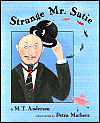
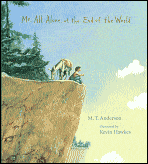
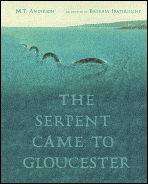 In 2003, Anderson teamed with illustrator Petra Mathers to create Strange Mr. Satie (Viking), another picture book biography — this time of French composer Erik Satie who was “a genius and a crank, a magician and a child, a fool and a visionary.” Kirkus Reviews called it an “irresistible invitation to discover a relatively little known, but profoundly influential, 20th-century artist” . . . The Game of Sunken Places (published by Scholastic) followed in 2004 — a suspenseful middle-grade fantasy adventure novel, featuring two boys staying with an eccentric relative at his mansion in rural Vermont who discover an old-fashioned board game that draws them into a complex mystery. As Booklist put it, Anderson has an “ability to slip between genres as fluidly as {these} middle-grade heroes straddle worlds.” Teaming up once again with Kevin Hawkes for Me, All Alone, at the End of the World (Candlewick, 2005), Anderson spun a thought-provoking picture book fable about solitude, man-made development, and self-reliance that raises many questions for contemplative young readers. And 2005 also brought us The Serpent Came to Gloucester (Candlewick), illustrated by the award-winning Russian artist/illustrator Bagram Ibatoulline. A sea adventure — the tale of a 19th-century sea serpent drawn from a true story — written in the rhythms and tone of a traditional sea chanty, Kirkus Reviews described it as “a 19th-century tale presented in grand, 19th-century style.”
In 2003, Anderson teamed with illustrator Petra Mathers to create Strange Mr. Satie (Viking), another picture book biography — this time of French composer Erik Satie who was “a genius and a crank, a magician and a child, a fool and a visionary.” Kirkus Reviews called it an “irresistible invitation to discover a relatively little known, but profoundly influential, 20th-century artist” . . . The Game of Sunken Places (published by Scholastic) followed in 2004 — a suspenseful middle-grade fantasy adventure novel, featuring two boys staying with an eccentric relative at his mansion in rural Vermont who discover an old-fashioned board game that draws them into a complex mystery. As Booklist put it, Anderson has an “ability to slip between genres as fluidly as {these} middle-grade heroes straddle worlds.” Teaming up once again with Kevin Hawkes for Me, All Alone, at the End of the World (Candlewick, 2005), Anderson spun a thought-provoking picture book fable about solitude, man-made development, and self-reliance that raises many questions for contemplative young readers. And 2005 also brought us The Serpent Came to Gloucester (Candlewick), illustrated by the award-winning Russian artist/illustrator Bagram Ibatoulline. A sea adventure — the tale of a 19th-century sea serpent drawn from a true story — written in the rhythms and tone of a traditional sea chanty, Kirkus Reviews described it as “a 19th-century tale presented in grand, 19th-century style.”
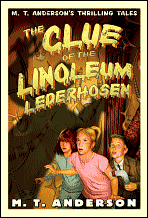 Having been inspired by those “particular kind{s} of
Having been inspired by those “particular kind{s} of
book{s} we had read as boys in the summer: books with a sense of freedom and release. Books where there were hijinx, adventures, playfulness, and a very thin line between reality and fantasy” (as he told Cynthia Leitich Smith in a 2005 interview), Anderson has also created M.T. Anderson’s Thrilling Tales series, which Child Magazine said “will leave kids laughing in their wake, thanks to deadpan prose, a ludicrous plot, and campy illustrations, all with the exquisite absurdity of a Monty Python skit.” A clever send-up of children’s series novels, the series began with 2005’s Whales on Stilts and was followed by ’06’s The Clue of the Linoleum Lederhosen (both published by Harcourt). This year we’ll see the third installment in the series, Jasper Dash and the Flame-Pits of Delaware. Eisha and I are big fans of these sharp, thrilling tales; as Kirkus Reviews put it, “{i}t doesn’t get any better than this.”
Now we’ve come full-circle to Anderson’s latest creation, the meticulously-researched Octavian, the first of two novels centering on sixteen-year old Octavian Nothing. He is the son of an African princess, and together they live a life of privilege, Octavian being the object of close surveillance among a group of rational philosophers in pre-Revolutionary War Boston. Eventually, Octavian realizes that these scientists are observing him as part of a long-term experiment, and . . . well, you’ll just have to read our aforementioned review (knock-knock jokes and all) if you haven’t already read this novel, quite unlike anything you’ll ever read, stunning in its scope and with moments of compelling poignancy. Named the 2006 National Book Award Winner in Young People’s Literature and one of four 2007 Printz Honor Books, you may have heard a wee bit about this novel last year. And, as for those who like to ask him about the period style in which he wrote the book and teens’ reactions to it, a question he probably gets asked a lot, here’s a previous comment of his, for the record:
I feel that adults underestimate teens intellectually. That pisses me off. The world is a complicated place, and I think my readers know that, and are excited by the complications they’re encountering. I want to portray the full realm of complexity that we all live with. Also, I’m not sure what else I could have done with the language, if I wanted to remain true to the character. Octavian is just not a slangy, finger-guns kind of guy. It may well be that the book will never be particularly popular because of the language. But I guess I had to write the book I envisioned, even if that means many people throw it across the room in irritation. I just hope they don’t throw it actually AT me.
Anderson attended Harvard, The University of Cambridge, and Syracuse, and he is a former faculty member of the Vermont College MFA in Children’s Literature program. He is a board member of the National Children’s Book and Literacy Alliance, a national not-for-profit organization that actively advocates for literacy, literature, and libraries, which he also discusses below.
We’d like to thank M.T. for taking the time to chat with us, for being such a good sport about getting interesting photos taken and for going out of his way to do so, and for letting us highlight him in this interview for our readers.
7-Imp: Your use of language is always one of the most distinctive elements of your works. It’s particularly striking in Feed, which is written in an original futuristic slang, and Pox Party, which is told via the writings of various characters with differing educational levels during the Revolutionary era. Please tell us about how you developed the distinct voices for each of these books.
M.T.: I really try to immerse myself in the linguistic world I’m portraying. So for Feed, I soaked myself in tangy pop brine: teen fashion magazines, issues of Maxim, and so on. After an hour or two reading the hip blather in Maxim –- updates on body hair, sex advice (“Learn her name”; “Try being in the same room with her during intercourse”), articles on “cool gear,” photo-shoots of waifs, plugs for cologne, hair gel, and portable tazers –- I was such a complete blithering idiot that it wasn’t difficult to write in a linguistically impoverished, dumb-ass style.
As for creating the future language, I figured that American English has always had a few linguistic positions that are filled with slang: an “informal male friend” slot (dude, man, pal, bud, chum, b’hoy – a 19th C New York one – etc.), an intensifier (cool, excellent, awesome, far-out, neat, swell, capital, etc.), and so on. I just made up new additions to these series. And then made up more stuff as I went along.
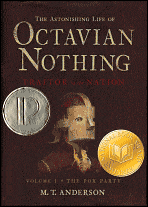 As for Octavian, the process was much more intense. From the time I really started working on the project, I restricted my reading to books written in the 18th C, books written about the 18th C, and books read in the 18th C that were written earlier (Classical texts, etc.). I wanted to discipline myself so that when I wrote, my first impulse would be to use archaic syntax and language. They would become natural to me.
As for Octavian, the process was much more intense. From the time I really started working on the project, I restricted my reading to books written in the 18th C, books written about the 18th C, and books read in the 18th C that were written earlier (Classical texts, etc.). I wanted to discipline myself so that when I wrote, my first impulse would be to use archaic syntax and language. They would become natural to me.
It was necessary, but kind of a stupid promise to myself. It means that for almost five years, I’ve read almost nothing written after 1800. Even still, it takes me about a week at least of reading 18th C prose particularly intensively before I begin working on Octavian at each pass, just so I blot out as much of my own world as possible and fill it as much as possible with his.
A couple of weeks ago I took a break between revisions of the book’s second volume and didn’t know what to do with myself. I started devouring more recent books: Raymond Chandler’s The Big Sleep, Jessica Hagedorn’s Dogeaters, Brian Evenson’s The Torn Curtain. Good god, it was delicious.
7-Imp: Can you tell us a bit about the Octavian research and how much time went into it?
M.T.: I read a lot. I have an extraordinarily bad memory, so I have to write everything down -– and even then, a lot gets lost. In the end, I have more than a thousand pages of notes for this project: an annotated bibliography, a file on 18th C language, and a timeline.
Along the way, I received wonderful assistance from several friends: Erika Gasser, who suggested books on American intellectual life in the 18th C; Laura Murphy, who suggested books on the history of slavery and various African cultures; and your fellow blogger John Bell, who, known by day for Oz and Ends, occasionally runs into a phone booth and comes out dressed in a silver wig and spandex frock-coat and fights evil and ignorance as Boston 1775.
7-Imp: Did you feel at all awkward about writing a story from the point of view of an African American slave? If so, then how did you deal with it?
M.T.: This issue actually delayed the writing of the book by five months. During that time, I thought a lot about the issue, talked it over with others. Concerned about the very real dangers of cooption, for almost half a year I writhed around trying to make up a new plot, trying to change who the narrator was . . . But it didn’t work. I kept coming back to Octavian himself. I knew him intensely. In many ways, I knew him better than I knew the narrators of my earlier books. I didn’t want to tell someone else’s story; his very idiosyncratic life was the one I wanted to narrate. And I didn’t want to water down the history: I knew that I wanted my character in the center of this storm, in the middle of this contestation of what independent identity meant.
In the end, all I can really say in my defense is that my commitment to these characters was total, encompassing these five years I’ve worked on the project, in which time it has become all-consuming. It’s for the reader to decide whether I was successful in producing these characters credibly. If I haven’t told the story well and with sufficient empathy, then I had no right to tell it.
7-Imp: Did Feed really have anything to do with criticizing the American educational system, or did Eisha totally make that up?
M.T.: In the course of the book, I did make some curmudgeonly jabs at an educational system that I feel is crippled by (and sometimes implicated in) the whole system of consumption I was complaining about.
In the late nineties –- and increasingly in the new millennium -– schools and universities themselves began to be absorbed into the general American format of consumer services. That is to say, if a kid from an underprivileged family is failing, too bad -– a certain amount of capital is necessary to succeed academically. If a wealthy kid is failing, it’s clearly the institution’s fault. My god, we’re paying a lot for this education, the parents say -– how could my son get a D? The teacher is not being entertaining enough. She is not doing her job well enough if the kid feels the material is complex. With so much competing for our child’s attention, how is he supposed to be interested in something boring like this? etc. etc.
Needless to say, until we start thinking of students as scholars to be trained and inspired rather than as consumers to be petted and placated, we’re going to continue to see the deterioration in levels of literate cognition we’ve seen since the mid-90s. Recent studies by the NEA, the Department of Education, the ETS, and the ACT testing board all confirm that over the last fifteen years, there has been a palpable decline in reading and in the ability of high school students to extrapolate complex ideas from what they’ve read. As our President has said with his customary wisdom, “Then you wake up at the high school level, and find out that the illiteracy level of our children are appalling.”
A democracy is only as enlightened and intelligent as its electorate. It’s imperative that we shift our attitudes toward learning. We must train our children to explore the magnificent and dangerous complexities of our world. We must teach them to respond to challenges with innovative, long-range solutions.
Readers interested in this subject might want to check out the website of the NCBLA {National Children’s Book and Literacy Alliance}, a group of children’s book writers (Katherine Paterson, Natalie Babbitt, Susan Cooper, et al), devoted to reawakening our republic’s sense of education as a cornerstone of democracy.
7-Imp: We read in your interview at Cynthia Leitich Smith’s Cynsations {to read the full interview, see below link under “for more information”} that you enjoy “writing line-by-line — creating character and detail” and that what stumps you are plots. When you set out to write Octavian, did you know it would be a two-volume story? And, if so, did you have difficulties outlining the plot in your mind? Do you generally tend to force yourself to outline plot first, or do you begin with character?
M.T.: I think different processes work with different books. For books that are more about external action, like Burger Wuss or Whales on Stilts, I like to have the plot-line worked out in advance. When I first submitted Burger Wuss to my editor, for example, I had the first forty pages written, then a scene by scene synopsis of the rest -– what each scene would accomplish, how it would all come together, and so on. I did the first two Whales on Stilts books with almost the same rigor of planning. (The Clue of the Linoleum Lederhosen is a mystery, so I had to work it all out ahead of time to make sure that the clues all lead in the same direction.)
I find that an incredibly fun way to approach writing, because you can be assured of events moving along at a fast clip, so when you’re writing each day, you can concentrate on embellishing the characters, the dialogue, the settings, and so on.
On the other hand, books that are more about internal exploration than external action are, I find, written more easily without an outline. I didn’t know the end of Feed when I began it. I had planned a different ending for Octavian Nothing than the one it will have. Part of that change in plan is based on some information I stumbled across that really opened my eyes.
My editor and I were always toying with the idea that Octavian would be in two volumes, since that’s a very 18th C novel thing to do. There’s a very logical resting point in the middle of the story. So we decided, finally, to make that the dividing line and break it into two.
And plus, if we published the whole thing in one bulky volume, we would damage the wrists of the young.
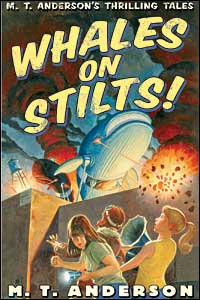 7-Imp: You mentioned that you’re working on your next Thrilling Tales book. We love those books. Could you kindly tell us a bit about the next one?
7-Imp: You mentioned that you’re working on your next Thrilling Tales book. We love those books. Could you kindly tell us a bit about the next one?
M.T.: I’m glad you love those books! I love writing them. They are a welcome break from ye olden tymes.
The next book in the series, Jasper Dash and the Flame-Pits of Delaware, takes our intrepid heroes into the jungles, the mountain passes, the ziggurats, temples, and monasteries of the Blue Hen State.
For most of us, Delaware is a land of mystery, severed from the rest of the world for generations by its prohibitive interstate tolls. But the time has come to reveal what really lies there, hanging off the belly of New Jersey.
In Jasper Dash and the Blah Blah Blah, Jasper realizes during a varsity staring competition at the junior high that the Delaware stare-eyes team is hiding a terrible secret . . . a secret that will lead him and his friends to ancient Dover -– often called the capitol of Delaware –- and beyond . . .
Included: dinosaurs, pith helmets, mustachios, lentils, catapults, airships, and gangsters’ molls.
7-Imp: We have always been impressed with your ability to write so well across the board in the realm of children’s literature — picture books, middle-grade novels, and YA lit. Are there any plans in the works for more picture books, by chance, in the near future?
M.T.: Thank you! But no, I don’t have any picture books in the works. I haven’t come across any picture book topics that have moved me, recently. I’d like to write a picture book someday about Vivaldi -– who wrote much of his most famous music for an orchestra of girls at an orphanage . . . I love that image, and I love the image of an acute asthma sufferer writing concerti about the joys of hayfever season . . . but so far, I can’t seem to get a bead on it. So nothing right now.
7-Imp: Have you always wanted to write for children and teens? Do you have any desire to write specifically for adults?
M.T. I’ve written short stories for adults, which have appeared in journals like Conjunctions, The Northwest Review, and The Colorado Review. For some years, I was the fiction editor of 3rd bed, a journal of absurdist and experimental lit, and that kept me connected with the world of adult literature.
I wish there weren’t such a division between the two literary worlds. Sometimes it seems like the only cross-over is when an “adult” author slums, making brash statements about how literature for kids has gone to the dogs and how they’re stomping down to the basement to sort us all out.
7-Imp: We have read that you eat broccoli, pace, and hum — and that you listen to music, often changing CDs — as you write. What’s your best writing music?
M.T. I don’t listen to music while I’m actually writing, or I get tricked into thinking that the music’s emotional power is my prose’s. You know, I’m all sniveling while I’m typing, and going, “God is this scene sad, boo hoo hoo,” or, conversely, crowing, “Yeehaw, this dialogue is hoppin’!” And then I read it later, and it’s completely banal, and I realize that it’s because I was reacting to the music, not to my own sorry prose.
So I gave that up some years back. Also, music makes it hard to hear the rhythm of words because you’re locked into a beat.
I do listen to music before I write, though, as a way of getting me into the novel’s particular world -– setting myself up in that language and character and place. So when I was writing Feed, for example, I listened to a lot of music of brutal interruption like Charles Mingus’s “Pithecanthropus erectus,” George Antheil’s Ballet Mecanique, and John Zorn’s “Forbidden Fruit.” When I’m working on Octavian, I listen to the music of the 18th C: classical stuff, what we’d now call “folk,” and African music that approximates what was probably played in the period. It all helps to get me in the right mood. In particular, I can hear Octavian’s voice in some of the Italian violin sonatas he loves so much –- Tartini, Corelli. There’s that Baroque sensibility, but also the solemnity, passion, and sadness.
In preparation for writing about Delaware, needless to say, I’m listening to Miklos Rozsa’s soundtrack to Sodom and Gomorrah.
7-Imp: What’s one thing most people don’t know about you?
M.T. Um, I have an acute and ongoing gastro-intestinal problem. Is that the kind of thing you want to know?
7-Imp: We like to pose to people the The Pivot Questionnaire, since who knew that asking someone, say, what their favorite sound or noise is could tell you so much about them. So here goes:
What is your favorite word?
M.T.: I don’t play favorites. You never know when you’re going to need to call on a word you’ve never met to help you out of a tight corner, so it doesn’t pay to love one up and shun another.
7-Imp: What is your least favorite word?
M.T.: “Slacks.” The word itself smells of polyester and thigh-sweat.
7-Imp: What turns you on creatively, spiritually or emotionally?
M.T.: Variety, solitude, and the alien.
7-Imp: What turns you off?
M.T.: Blows to the back of the head.
7-Imp: What is your favorite curse word?
M.T.: It’s too offensive to type. But I will say that I love it because it’s a New England special –- and you can even drop the “R.”
7-Imp: What sound or noise do you love?
M.T. The wind. That particular muted silence of falling snow.
7-Imp: What sound or noise do you hate?
M.T.: Pounding through the floor-boards: the bass-line of someone else’s music. Or the treble-line of someone else’s sex-life. I used to live in an apartment where the people below me had a muppet fetish and used special voices. It was not an easy time.
7-Imp: What profession other than your own would you like to attempt?
M.T.: This is a tough one, because I have no skills.
I think, in season, I could be the back half of a dragon at Spooky World.
7-Imp: What profession would you not like to do?
M.T.: Any of those professions where you have to leave the house.
7-Imp: If Heaven exists, what would you like to hear God say when you arrive at the Pearly Gates?
M.T.: “Don’t worry. It all made perfect sense.”
For more information:
- Anderson discusses Octavian at NPR (audio only) after receiving the National Book Award; January 29, 2007
- Interview (“Like his protagonists, he’s a character study”) at boston.com; interview by David Mehegan from The Boston Globe; December 19, 2006
- “M.T. Anderson: Eats Broccoli, Paces and Hums” at NPR (their “Novel Ideas” feature); November 24, 2006
- School Library Journal’s National Book Award announcement; November 16, 2006
- The Book Standard’s “exclusive interview” with Anderson (in which he provides a brief sneek peak into the second volume of Octavian as well as some thoughts on the place of didacticism in children books); conducted by Kirkus Reviews; November 16, 2006
- “Patriot Games”; School Library Journal; interview by Kathleen Horning; November 1, 2006
- Interview at not your mother’s bookclub; October 6, 2006
- “Children’s Bookshelf {at publishersweekly.com} Talks With M.T. Anderson“; written by Sue Corbett; October 5, 2006
- *2006 interview at Harcourt Books at the release of The Clue of the Linoleum Lederhosen (in which he tells Harcourt that he’s really “seven monkeys, six typewriters, and a Speak & Spell”)
- Interview at Cynthia Leitich Smith’s wonderful Cynsations at the release of Whales on Stilts; September 12, 2005
- Transcript of “Virtual Visit: A Chat with Author M.T. Anderson,” conducted by Beth Gallaway for the Metrowest Massachusetts Regional Library System in which teens and librarians were invited to log in to a live author chat; July 28, 2005
- Hear an excerpt of Whales on Stilts, read by Anderson at NPR; June 7, 2005; (the excerpt is also in print at the link)
- “Life-and-death competition in an enchanted world”; interview at BookPage at the release of The Game of Sunken Places; interview by Heidi Henneman; July 2004
- “Hungry for M.T. Anderson” (.pdf file); interview by Joel Shoemaker at the release of Thirsty; VOYA; June 2004
- And, yes, he was declared a Hot Man of Children’s Literature in June of ’06 . . .

So M.T. Anderson is really a method actor? I love it! (Not that I’m going restrict my reading to the 18th century or read Maxim anytime soon, but I’m thinking of using his immersion idea for my novel about a girl who is fed chocolate by men who have bodies like Tiger Woods and voices like Lyle Lovett’s)
Seriously, I’m a huge M.T. Anderson fan. When I was part of a adult women’s book club for a brief while, I made everyone read Feed to counteract the “empowerment” vibe. It was a huge hit. And Octavian Nothing? It makes me want to quit writing because I know I’ll never be that good. The way he can write about brutality without sensationalizing it, and the language, the make-no-apologies-for-its-pitch-perfect-brilliance language!
Wonderful list of resources at the end. This will keep me on the “All M.T. All the Time” channel of The Feed for days…
Eisha, Sending you and your family lots of good healing thoughts…
Jules, Loved the disembodied head shot. It was too cool.
M.T. Anderson is unbelievably brilliant and I am so glad you shared this interview with us. I totally loved reading about his writing process. Nice to know this distinguished writer has a fun sense of humor to boot.
Another great interview. I’m curious, in person does one address him as M.T. (which always sounds like “empty” to these ears) or by his middle name?
Yeah, I really like the deep questions. But we already know what a genius he is!
Eisha, I’m sorry for your troubles, whatever they are. I’m joining thoughts with Vivian to send you a mess of good ones all at once.
That placement of the girlfriend head is genius. You guys are so funny.
Oh heavens, that is my disembodied head — not his girlfriend, but you’re making me blush. His girlfriend, Nicole, was there when M.T. visited Eisha at her library branch, and she (Nicole, that is) took the photos. It was M.T.’s idea to pretend to hold my head on a library table — since, wah wah, I couldn’t be there — which my husband added in later via PhotoShop.
David, I believe all along we’ve addressed him as “M.T.,” but he may have signed off some emails as Tobin. Don’t quote me on that.
Sara, thanks for the compliment on the resource list. As I told M.T., blast my type-A personality, I can’t just throw up the interview responses without a proper intro and can’t conclude without a bibliography of sorts (though, of course, those URLs are not cited in any formal way). It’d be perfectly acceptable in the blogosphere to just slap up his answers, but I just can’t help being a Big Nerd. Plus, maybe the intro and bibliography of sorts will create new readers. Mwahahahahahaha.
Jules, guess I should learn to read more closely. You said it was you, didn’t you?
Der.
Fantastic interview, and very well-presented (and I adored the interview bibliography, because I am that nerdy). Well done!
[…] Anderson is interviewed at 7 Impossible […]
So can you keep us posted if he breaks up with Nicole? I am so in love with the man’s mind.
Well, CW, you can hardly be alone – he is one of Fuse #8’s Hot Men of Children’s Literature, after all. But from my brief glimpse of them together, I’d say they’re very well suited.
I think Thirsty is the best book around and that mt should write a sequel to it…..plus do any of u have his email address so i can email him about this????
if u do have his email emial it to kidhater135@yahoo.com.!
Crushed Writer, I am sooooo with you. But seriously, I’m overjoyed that you guys did this interview. It’s fantastic! I am the hugest (not physically, at least I don’t think so) M.T. Anderson fan on the face of the planet and it’s my goal to someday be even half the writer he is.
[…] crush on M.T. Anderson ever since I read Feed. Does that count? And you totally met him in person that time. Don’t think I’ve […]
[…] Green , M.T.Anderson (an interview), and Bernard Beckett (a review) Comments […]
Скачать фотошоп cs 4
[…] all-time favorite interview thus far at 7-Imp. Jules: It’s a tie: Haven Kimmel and M.T. Anderson. eisha: We’re almost at the half-way mark in 2008. What’s been your favorite […]
[…] Tricky. There have been so many good answers, both touching and hilarious. M.T. Anderson’s answer to the question "What profession other than your own would you like to attempt?" […]
Hello! This post couldn’t be written any better! Reading through this post reminds me of my good old room mate! He always kept talking about this. I will forward this article to him. Pretty sure he will have a good read. Thanks for sharing!
[…] and because he’s pictured holding my disembodied head, I bring you the 7-Imp 2007 interview with M.T. […]
Very Very Fantastic
Fantastic blog! Do you have any suggestions for aspiring writers? I’m hoping to start my own site soon but I’m a little lost on everything. Would you propose starting with a free platform like WordPress or go for a paid option? There are so many choices out there that I’m completely overwhelmed .. Any recommendations? Kudos!
Highly energetic blog, I liked that a lot. Will there be a part 2?
[…] This video is about an hour and not at all what I expected him to say, but I like it: It’s M.T. Anderson talking at Cornell about darkness in children’s lit. I like his idea of a balanced […]
[…] And this photo from M. T. Anderson? One of my favorite responses to the diversity […]
[…] NPR interview, Nov. 2006Q&A with Publishers WeeklyCynsations interview with Cynthia Leitich SmithSeven Impossible Interviews Before Breakfast #13 […]